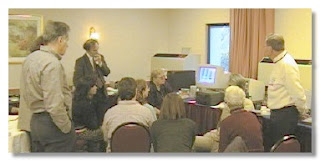"Wonderful opportunity. Positive learning environment. Technically on
target, practical, good depth. I appreciated inclusion of theoretical
and philosophical discussion. Super learning experience." - Dick A.
Genardi, Ph.D., Director Behavioral Health Associates, Inc.,Dayton, Ohio
There have been scores of books written on Biofeedback, Neurofeedback
and Applied Psychophysiology. We introduce you to those we feel are the
best and most relevant of them through our training,website etc. New
books for the general public and several for professionals have been
published recently. Most of the focus at present is on Neurofeedback
because it is the most dramatic and fastest growing type of biofeedback.
One of those books is our own, MINDFITNESS TRAINING: Neurofeedback and
The Process.
There have been thousands of scientific studies in this field - many
of them published in the most refereed journals in their respective
disciplines. Some world class scientists, practitioners and
neurophilosophers believe that biofeedback and neurofeedback discoveries
rank among the most important technological, educational and medical
breakthroughs of the last several centuries. If you consider that
self-knowledge and heuristic (self) learning are generally considered to
be the most important skills most human beings can develop, then it is
easy to understand why biofeedback is receiving so much attention.
The simplest explanation is that biofeedback is the use of
instrumentation to feed back information about the psychophysiology
(mind and body) of a human being to him or herself. Given this
information most individuals can increase their control
(self-regulation) of whatever activity is being monitored. Things begin
to get exciting when we look into the implications of these
extraordinary levels of control and what the benefits are to those
learning these high levels of self-regulation.
The resulting profound mind/body changes are applicable to over four
hundred common clinical disorders and the list is growing continuously.
There are also extraordinary applications to Performance and Life
Enhancement. This means there are many forms of biofeedback and many
types of instrumentation. Some of the most common are: electromyograph
(EMG) Electrical activity of the muscles (Voluntary Nervous System),
Electroencephalograph (EEG) Electrical activity of the brain (Central
Nervous System), Temperature (TEMP) Peripheral blood flow, Electrodermal
Response (EDR, SCR, GSR, etc., Sweat Gland activity, Heart Rate (HR)
including the extraordinarily exciting new field of neurocardiology),
and Blood Pressure (BP) all Autonomic Nervous System measures. Applied
Psychophysiology is the large field of study of the mind and body and
the practical applications of that research. Biofeedback and
Transactional Psychophysiology are important parts of this greater
field.
Get More Info Click here : What is Biofeedback, Neurofeedback and Applied Psychophysiology?

